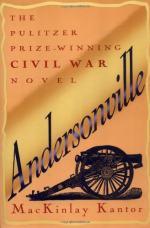“Stonewall Jackson Crossing into Maryland,” was another travesty, of about the same literary merit, or rather demerit, as “The Bonnie Blue Flag.” Its air was that of the well-known and popular negro minstrel song,” Billy Patterson.” For all that, it sounded very martial and stirring when played by a brass band.
We heard these songs with tiresome iteration, daily and nightly, during our stay in the Southern Confederacy. Some one of the guards seemed to be perpetually beguiling the weariness of his watch by singing in all keys, in every sort of a voice, and with the wildest latitude as to air and time. They became so terribly irritating to us, that to this day the remembrance of those soul-lacerating lyrics abides with me as one of the chief of the minor torments of our situation. They were, in fact, nearly as bad as the lice.
We revenged ourselves as best we could by constructing fearfully wicked, obscene and insulting parodies on these, and by singing them with irritating effusiveness in the hearing of the guards who were inflicting these nuisances upon us.
Of the same nature was the garrison music. One fife, played by an asthmatic old fellow whose breathings were nearly as audible as his notes, and one rheumatic drummer, constituted the entire band for the post. The fifer actually knew but one tune “The Bonnie Blue Flag” —and did not know that well. But it was all that he had, and he played it with wearisome monotony for every camp call—five or six times a day, and seven days in the week. He called us up in the morning with it for a reveille; he sounded the “roll call” and “drill call,” breakfast, dinner and supper with it, and finally sent us to bed, with the same dreary wail that had rung in our ears all day. I never hated any piece of music as I came to hate that threnody of treason. It would have been such a relief if the, old asthmatic who played it could have been induced to learn another tune to play on Sundays, and give us one day of rest. He did not, but desecrated the Lord’s Day by playing as vilely as on the rest of the week. The Rebels were fully conscious of their musical deficiencies, and made repeated but unsuccessful attempts to induce the musicians among the prisoners to come outside and form a band.
CHAPTER XLV.
August—needles stuck in pumpkin seeds—some phenomena of starvation —rioting in remembered luxuries.
“Illinoy,” said tall, gaunt Jack North, of the One Hundred and Fourteenth Illinois, to me, one day, as we sat contemplating our naked, and sadly attenuated underpinning; “what do our legs and feet most look most like?”
“Give it up, Jack,” said I.
“Why—darning needles stuck in pumpkin seeds, of course.” I never heard a better comparison for our wasted limbs.




